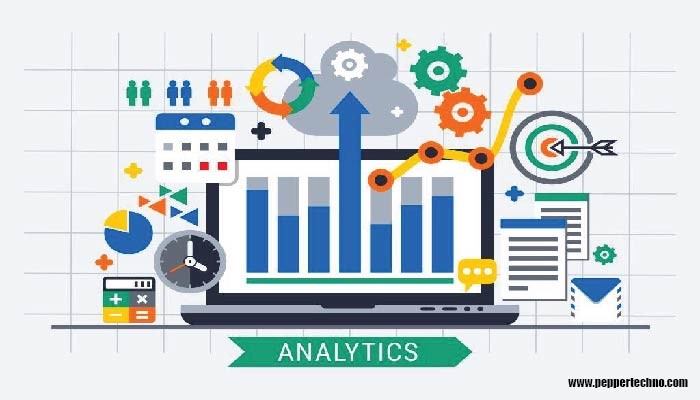Analytic Tools for Business: Complete Overview
Welcome to the dynamic world of analytic tools for business! In today’s fast-paced digital landscape, data is king, and having the right tools to analyze and interpret that data can make all the difference in driving your business forward. Whether you’re a small startup or a large corporation, harnessing the power of analytics is essential for making informed decisions, understanding customer behavior, and optimizing your overall performance. So buckle up as we dive into the realm of analytics tools and discover how they can revolutionize your business strategy!

The Importance of Analytics for Businesses
In today’s digital age, data is king. For businesses to thrive and stay ahead of the competition, they need valuable insights into their operations. This is where analytics tools come into play. By harnessing the power of analytics, companies can make informed decisions based on concrete data rather than guesswork.
Analytics tools allow businesses to track key performance indicators, monitor customer behavior, and identify trends. This information is invaluable for shaping marketing strategies, improving products or services, and enhancing overall business performance.
Gone are the days of making decisions based on gut feelings or outdated information. With analytics tools at their disposal, businesses can adapt quickly to changing market conditions and consumer preferences. It’s no longer just an option – it’s a necessity for survival in today’s competitive landscape.
By embracing analytics tools, companies can unlock new opportunities for growth and innovation while staying one step ahead of their competitors. The importance of leveraging data-driven insights cannot be overstated in a world driven by technology and ever-evolving consumer demands.
Types of Analytics Tools
When it comes to analytics tools for business, there are different types that cater to various needs and preferences.
- Descriptive Analytics: These tools help in summarizing historical data to understand what has happened in the past.
- Predictive Analytics: These tools use statistical algorithms and machine learning techniques to predict future outcomes based on historical data patterns.
- Diagnostic Analytics: This type of tool focuses on identifying why something happened by digging deeper into the data to uncover root causes.
- Prescriptive Analytics: Tools under this category not only provide insights into what is likely to happen but also offer suggestions on possible actions that can be taken.
Each type of analytics tool offers unique benefits and plays a crucial role in helping businesses make informed decisions based on data-driven insights.
Top Analytics Tools for Business
When it comes to analytics tools for business, having the right ones can make a significant difference in understanding your data and making informed decisions. Here are some of the top analytics tools that businesses can leverage to gain valuable insights:
Google Analytics is a popular choice for businesses looking to track website traffic, user behavior, and conversions. With its user-friendly interface and robust features, Google Analytics provides detailed reports on various metrics.
Adobe Analytics offers advanced capabilities for analyzing customer interactions across different touchpoints. It enables businesses to create customized reports and dashboards, allowing them to delve deep into their data.
Tableau is known for its powerful data visualization capabilities, helping businesses turn complex datasets into easy-to-understand visuals. With interactive dashboards and real-time analytics, Tableau empowers users to spot trends and patterns quickly.
These analytics tools play a crucial role in helping businesses uncover actionable insights from their data, ultimately driving growth and success.
A. Google Analytics
Google Analytics is a powerful tool that provides valuable insights into website traffic and user behavior. With its user-friendly interface, businesses can track key metrics such as page views, bounce rates, and conversion rates. This data helps businesses understand their audience better and make informed decisions to improve their online presence.
One of the main advantages of Google Analytics is its ability to create customized reports tailored to specific business goals. By setting up goals and events tracking, companies can measure the success of their marketing campaigns and optimize their strategies for better results. Additionally, the real-time reporting feature allows businesses to monitor website activity as it happens.
Furthermore, Google Analytics offers demographic information about site visitors, including age, gender, and location. This data enables businesses to target their marketing efforts more effectively towards specific audiences. Google Analytics is an essential tool for any business looking to analyze and enhance its online performance.
B. Adobe Analytics
Adobe Analytics is a powerful tool that provides businesses with in-depth insights into their online performance. By tracking user behavior across various digital channels, Adobe Analytics helps companies understand customer preferences and optimize their marketing strategies.
With features like real-time analytics and customizable dashboards, Adobe Analytics allows businesses to make data-driven decisions quickly and efficiently. The platform also offers advanced segmentation capabilities, enabling organizations to target specific audience segments with tailored messaging.
One key advantage of Adobe Analytics is its integration with other Adobe products, such as Adobe Marketing Cloud, which allows for seamless data sharing and analysis. This holistic approach enables businesses to gain a comprehensive view of their entire marketing ecosystem.
Adobe Analytics empowers businesses to measure the impact of their online efforts accurately and drive continuous improvement in their digital marketing initiatives.
D. Tableau
When it comes to data visualization and business intelligence, Tableau stands out as a powerful tool that helps businesses make sense of their data. With its user-friendly interface and robust features, Tableau allows users to create interactive dashboards and reports that provide valuable insights at a glance.
One of the key strengths of Tableau is its ability to connect to multiple data sources, making it easy for businesses to consolidate information from various platforms into one cohesive view. Whether you’re analyzing sales figures, tracking website performance, or measuring customer satisfaction levels, Tableau can handle large datasets with ease.
Moreover, Tableau offers advanced analytics capabilities such as predictive modeling and statistical analysis, enabling businesses to uncover trends and patterns that may not be immediately apparent. By leveraging these features, organizations can make informed decisions based on data-driven insights rather than gut feelings or guesswork.
Tableau empowers businesses to transform raw data into actionable intelligence quickly and efficiently. Its intuitive design coupled with powerful analytical tools makes it a must-have for any company looking to stay ahead in today’s competitive landscape.
Implementing and Utilizing Analytics in Your Business
Once you’ve selected the right analytics tools for your business, it’s crucial to implement them effectively to maximize their potential. Start by defining clear goals and key performance indicators (KPIs) that align with your business objectives. This will help you track the metrics that matter most.
Next, ensure that your team is properly trained on how to use the analytics tools efficiently. Providing ongoing education and support can enhance their data analysis skills and drive better decision-making within your organization.
Regularly monitor and analyze the data generated by these tools to gain valuable insights into customer behavior, market trends, and overall performance. Use this information to make informed strategic decisions that can positively impact your bottom line.
By integrating analytics into your day-to-day operations, you’ll be able to identify opportunities for growth, optimize processes, and stay ahead of the competition in today’s data-driven business landscape.
Conclusion
In today’s competitive business landscape, leveraging analytics tools is essential for staying ahead of the curve. Understanding and analyzing data can provide valuable insights that drive strategic decision-making and ultimately lead to improved performance.
By utilizing top analytics tools like Google Analytics, Adobe Analytics, and Tableau, businesses can gain a deeper understanding of their customers, track key metrics, and visualize data in meaningful ways. These tools offer powerful features that enable businesses to optimize their operations, enhance marketing strategies, and boost overall efficiency.
Implementing analytics into your business strategy is not just a trend but a necessity in today’s digital age. By harnessing the power of data-driven insights, businesses can make informed decisions that drive growth and success.
So why wait? Start exploring the world of analytics tools for business today and unlock the potential for your organization’s future success!



